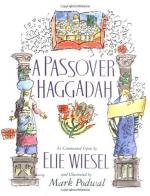|
This section contains 3,921 words (approx. 14 pages at 300 words per page) |

|
SOURCE: Pfefferkorn, Eli. “Elie Wiesel: The Inward Eyewitness in The Testament.” Modern Language Studies 14, no. 1 (winter 1984): 3-10.
In the following essay, Pfefferkorn underscores the role of verisimilitude in Wiesel's oeuvre.
Among the various factors that shape Elie Wiesel's poetic vision, verisimilitude is probably one of the most decisive. Whether drawing on his own concentration camp experiences or on other witness accounts, or on historical documentation, Wiesel goes to great lengths to set the plots of his stories in realistic backgrounds. This faithfulness to historical veracity seems to emanate from the impulse to bear witness, which has become his life's commitment. Wiesel regards individual testimony, carried by word of mouth or inscribed in letters, as a cumulative process in which collective memory is tantamount to ethnic survival; oblivion, in contrast, equates with the death of a people and its culture.
The underlying triple connection between memory, testimony and survival...
|
This section contains 3,921 words (approx. 14 pages at 300 words per page) |

|


